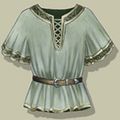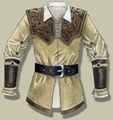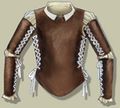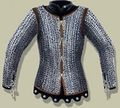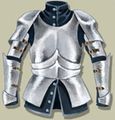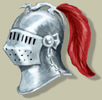Armor
Armor protects its wearer from damage by decreasing the damage factor (usually) and increasing the critical divisor.
| Armor Navigation - edit | ||
|---|---|---|
| Armor | ||
| Armor Use | ||
| Spell hindrance | ||
| Specializations | ||
| Warrior | Rogue | Paladin |
| Reinforce | Evasion | Blessing |
| Support | Stealth | Casting |
| Crush | Support | Fluidity |
| Puncture | ||
| Slash | ||
General Information
Armor is divided into main armor and armor accessories. Kinds of main armor are distinguished by their armor group (AG) and armor sub-group (ASG). Characters may only wear one set of main armor and one of each kind of accessory at a time.
The first armor in an armor group is usually torso armor, covering only the chest, stomach, and back. The second type will cover the arms and hands of the wearer, then the third type will cover the legs as well. The last type of armor in a group covers the entire body. When a character wears an accessory such as greaves to increase the coverage of their armor, the ASG remains unchanged but the penalties (moving, casting, RT) change to correspond with the greatest degree of coverage; see table below for more details. For example, if a character was wearing light leather that covers just the torso, they might decide to add arm greaves at one point. The behavior of the character's armor would then change to that of full leather since the total coverage would then be torso and arms.
Note that penalties are assessed based on the worst (most extensive) coverage. Wearing a helm on the head or aventail on the neck while wearing ASG5/light leather will give ASG8/double leather penalties, but will NOT give the protection (see next paragraph) of the heavier armor to the arms or legs, since those body locations are not covered in this case: only the chest, abdomen, back, and head (or neck) are covered in this example. For this reason it is usually advised to wear the heaviest armor the character is trained for, and not use accessories at all. Some characters prefer to wear accessories in any case, but this is usually either for cosmetic reasons (the helm perfectly matches the look sought) or entirely different mechanical benefits (such as an Enhancive item).
When a type of armor in a class doesn't cover a body part, the part counts as being covered by one class less when determining the critical rank of a strike. For example, when striking someone wearing torso plate, or metal breastplate, the weapon uses the damage factor of striking someone in plate, no matter where the strike lands. However, when striking an uncovered portion, the amount of raw damage required per critical rank is only 9 damage, instead of the 11 damage which is standard for plate armor (these numbers are called critical divisors). Therefore, a strike of 18 raw damage using a longsword (a +203 to +208 endroll) to an arm is a level 2 crit (+7 extra damage, for a total of 25 damage), but if the same strike were to hit the chest, it'd only be a level 1 crit (+1 extra damage, for a total of 19 damage).
Note: the endrolls noted may be much higher if the victim has significant amounts of DFRedux. For example, a character with 60% redux in the example given above would require a +358 endroll for the same result.
Armor Attributes
| AG | ASG | Name | Base Weight |
RT | AP | CvA | Spell Hindrance (%) | ||||||||||||||
|---|---|---|---|---|---|---|---|---|---|---|---|---|---|---|---|---|---|---|---|---|---|
| Norm | Magic | MnS | MjS | Cleric | MnE | MjE | Ranger | Sorcerer | Wizard | Bard | Empath | MnM | MjM | Paladin | Max | ||||||
| 1. Cloth | 1 | Normal Clothing | - | 0 | 0 | 25 | 20 | - | - | - | - | - | - | - | - | - | - | - | - | - | - |
| 2 | Robes | 8 | 0 | 0 | 25 | 15 | - | - | - | - | - | - | - | - | - | - | - | - | - | - | |
| 2. Leather | 5 | Light Leather | 10 | 0 | 0 | 20 | 15 | - | - | - | - | - | - | - | - | - | - | - | - | - | - |
| 6 | Full Leather | 13 | 1 | -1 | 19 | 14 | - | - | - | - | - | - | - | - | - | - | - | - | - | - | |
| 7 | Reinforced Leather | 15 | 2 | -5 | 18 | 13 | - | - | - | - | 2 | - | 1 | 2 | - | - | - | 2 | - | 4 | |
| 8 | Double Leather | 16 | 2 | -6 | 17 | 12 | - | - | - | - | 4 | - | 2 | 4 | 2 | - | 2 | 4 | - | 6 | |
| 3. Scale | 9 | Leather Breastplate | 16 | 3 | -7 | 11 | 5 | 3 | 4 | 4 | 4 | 6 | 3 | 5 | 6 | 3 | 4 | 4 | 6 | 2 | 16 |
| 10 | Cuirbouilli Leather | 17 | 4 | -8 | 10 | 4 | 4 | 5 | 5 | 5 | 7 | 4 | 6 | 7 | 3 | 5 | 5 | 7 | 3 | 20 | |
| 11 | Studded Leather | 20 | 5 | -10 | 9 | 3 | 5 | 6 | 6 | 6 | 9 | 5 | 8 | 9 | 3 | 6 | 6 | 9 | 4 | 24 | |
| 12 | Brigandine Armor | 25 | 6 | -12 | 8 | 2 | 6 | 7 | 7 | 7 | 12 | 6 | 11 | 12 | 7 | 7 | 7 | 12 | 5 | 28 | |
| 4. Chain | 13 | Chain Mail | 25 | 7 | -13 | 1 | -6 | 7 | 8 | 8 | 8 | 16 | 7 | 16 | 16 | 8 | 8 | 8 | 16 | 6 | 40 |
| 14 | Double Chain | 25 | 8 | -14 | 0 | -7 | 8 | 9 | 9 | 9 | 20 | 8 | 18 | 20 | 8 | 9 | 9 | 20 | 7 | 45 | |
| 15 | Augmented Chain | 26 | 8 | -16 | -1 | -8 | 9 | 11 | 11 | 10 | 25 | 9 | 22 | 25 | 8 | 11 | 10 | 25 | 8 | 55 | |
| 16 | Chain Hauberk | 27 | 9 | -18 | -2 | -9 | 11 | 14 | 14 | 12 | 30 | 11 | 26 | 30 | 15 | 14 | 15 | 30 | 9 | 60 | |
| 5. Plate | 17 | Metal Breastplate | 23 | 9 | -20 | -10 | -18 | 16 | 25 | 25 | 16 | 35 | 21 | 29 | 35 | 21 | 25 | 21 | 35 | 10 | 90 |
| 18 | Augmented Breastplate | 25 | 10 | -25 | -11 | -19 | 17 | 28 | 28 | 18 | 40 | 24 | 33 | 40 | 21 | 28 | 21 | 40 | 11 | 92 | |
| 19 | Half Plate | 50 | 11 | -30 | -12 | -20 | 18 | 32 | 32 | 20 | 45 | 27 | 39 | 45 | 21 | 32 | 21 | 45 | 12 | 94 | |
| 20 | Full Plate | 75 | 12 | -35 | -13 | -21 | 20 | 45 | 45 | 22 | 50 | 30 | 48 | 50 | 50 | 45 | 50 | 50 | 13 | 96 | |
Armor Sub-Group
The armor sub-group (often referred to as ASG) is the method by which armor is categorized. Armors fall into one of five groups: Cloth, Leather ("Soft Leather"), Scale ("Rigid Leather"), Chain or Plate. Within each of these groups are 4 armor sub-groups. However, in the case of the Cloth group, armor sub-groups 3 and 4 are no longer available within the game.
In each armor group, the lowest ASG has the least amount of coverage, while the highest ASG has the most amount of coverage.
Armor accessories can increase the effective ASG of your armor. That is, if you wear double chain, which covers torso and arms, and also wear a helmet and leg greaves, you will have an effective ASG exactly as if you were wearing a chain hauberk.
Coverage
Each armor type has a built in level of coverage that it provides to your body. This coverage can prevent damage to those areas of your body in the form of critical hits.
In each armor group, the lowest ASG has the least amount of coverage (just the torso), while the highest ASG has the most amount of coverage (head to toe).
Armor accessories can increase the effective ASG of your armor. That is, if you wear double chain, which covers torso and arms, and also wear a helmet and leg greaves, you will receive the same amount of coverage exactly as if you were wearing a chain hauberk.
Roundtime Penalty
The Roundtime Penalty is a number (in seconds) added to your base roundtime when swinging a weapon. This penalty is located in the "RT" column in the attributes table above.
By training in the armor use skill, this roundtime can be reduced. Each 20 skill bonus points removes one second of armor-based roundtime (the first second is removed at 10 bonus points, and then every 20 thereafter). The skill bonus required to fully train off the roundtime penalty is ((Roundtime Penalty * 20) - 10).
High bonuses in dexterity and agility also offset this penalty.
Example: When wearing brigandine armor (ASG 12), attacks have a 6 second roundtime penalty. The required armor use skill bonus to train off the extra roundtime is ((6 * 20) - 10) = 110, which is achieved with 27 skill ranks (111 bonus).
Action Penalty
The action penalty is a modifier subtracted from your chance to perform a standard maneuver roll. A maneuver may include anything from dodging Elemental Wave and Earthen Fury attacks, to something as mundane as standing up.
The skill bonus required to reduce the action penalty to its base value is ((Roundtime Penalty * 20) - 10).
For a character exactly trained for full plate at cap, the AP (-35) is a little bit above the difference between training 1x and 2x in Physical Fitness*. Over training in Armor Use to reduce the action penalty and/or using armored evasion can reduce the maneuver penalty by a fairly significant amount.
The action penalty is also a factor in Defensive Strength (DS). The evade portion of DS has an armor hindrance penalty equal to 1/2 of the action penalty. For example, an action penalty of -20 results in -10% to evade DS. This penalty is likewise reduced by armor use overtraining and/or Armored Evasion.
*Note: This should not be interpreted to mean that Physical Fitness provides a linear increase to maneuver rolls, only that the absolute difference between 1x and 2x training happens to be slightly less than 35. The exact mechanics of the standard maneuver roll are not known.
Cast vs Armor (CvA)
Cast versus Armor (CvA) is a factor in warding attack spells that reflects how well armor protects against magic. Lower CvA means the armor is more protective. Heavier armor types are harder to penetrate. Magical or enchanted armors protect the wearer better than non-magical or non-enchanted armors, and this differential also increases with the heavier types of armor. In practice, wearing heavier and magical armor is equivalent to having a higher target defense for any target.
Like AvD, CvA is added directly to the combat roll to determine a warding spell's success. Positive values represent a greater vulnerability to attack, and negative values represent less.
Per GM Cyper's post introducing CvA, use of a non-magical shield will provide -5 CvA, and a magical shield -10 CvA, which is not cumulative with armor. Functionally, this means that shields only provide a CvA benefit when Armor Group 1/clothing is worn.
CvA can be modified by Shield Focus and Ensorcell.
| AG | Cloth | Leather | Scale | Chain | Plate | |||||||||||||
|---|---|---|---|---|---|---|---|---|---|---|---|---|---|---|---|---|---|---|
| AsG | 1 | 2 | 5 | 6 | 7 | 8 | 9 | 10 | 11 | 12 | 13 | 14 | 15 | 16 | 17 | 18 | 19 | 20 |
| CvA (normal) | 25 | 25 | 20 | 19 | 18 | 17 | 11 | 10 | 9 | 8 | 1 | 0 | -1 | -2 | -10 | -11 | -12 | -13 |
| CvA (magical) | 20 | 15 | 15 | 14 | 13 | 12 | 5 | 4 | 3 | 2 | -6 | -7 | -8 | -9 | -18 | -19 | -20 | -21 |
Spell Hindrance
The below table shows the base hindrances for each armor type.
If a player is under trained for their armor type, the penalty will increase, but it will never exceed the Max hindrance shown in the rightmost column. The skill bonus required to reduce hindrance to the base value is:
Armor Use Bonus Required = (Base Hindrance * 20) - 10
Example: When wearing brigandine armor (ASG 12), Cleric spells have a base hindrance of 7%. The required armor use skill bonus is ((7 * 20) - 10) = 130, which is equivalent to 35 skill ranks.
Hindrance will never be less than the value shown, except when temporarily under the effects of the Paladin abilities Faith's Clarity (1603) and Armored Fluidity.
Undertraining penalty formula:
Total Hindrance = Base Hindrance * (1 + (Required Bonus - Current Bonus) / 20)
Example: As above, 130 armor use skill bonus (35 ranks) is required to cast Cleric spells in brigandine armor with the base hindrance of 7%. If the caster has only 90 skill bonus (20 ranks), the hindrance is modified by a factor of (1 + (130 - 90)/20) = 3, so the actual hindrance would be 21%.
Example 2: In the same scenario with Cleric spells in brigandine, if the caster has 0 armor use skill, then hindrance would be modified by a factor of (1 + (130 - 0)/20) = 7.5, which would result in 52% hindrance, but since this exceeds brigandine armor's max hindrance of 28% according to the table, the actual hindrance would be 28%.
| AG | ASG | Name | Spell Hindrance (%) | |||||||||||||
|---|---|---|---|---|---|---|---|---|---|---|---|---|---|---|---|---|
| MnS | MjS | Cleric | MnE | MjE | Ranger | Sorcerer | Wizard | Bard | Empath | MnM | MjM | Paladin | Max | |||
| 1. Cloth | 1 | Normal Clothing | - | - | - | - | - | - | - | - | - | - | - | - | - | - |
| 2 | Robes | - | - | - | - | - | - | - | - | - | - | - | - | - | - | |
| 2. Leather | 5 | Light Leather | - | - | - | - | - | - | - | - | - | - | - | - | - | - |
| 6 | Full Leather | - | - | - | - | - | - | - | - | - | - | - | - | - | - | |
| 7 | Reinforced Leather | - | - | - | - | 2 | - | 1 | 2 | - | - | - | 2 | - | 4 | |
| 8 | Double Leather | - | - | - | - | 4 | - | 2 | 4 | 2 | - | 2 | 4 | - | 6 | |
| 3. Scale | 9 | Leather Breastplate | 3 | 4 | 4 | 4 | 6 | 3 | 5 | 6 | 3 | 4 | 4 | 6 | 2 | 16 |
| 10 | Cuirbouilli Leather | 4 | 5 | 5 | 5 | 7 | 4 | 6 | 7 | 3 | 5 | 5 | 7 | 3 | 20 | |
| 11 | Studded Leather | 5 | 6 | 6 | 6 | 9 | 5 | 8 | 9 | 3 | 6 | 6 | 9 | 4 | 24 | |
| 12 | Brigandine Armor | 6 | 7 | 7 | 7 | 12 | 6 | 11 | 12 | 7 | 7 | 7 | 12 | 5 | 28 | |
| 4. Chain | 13 | Chain Mail | 7 | 8 | 8 | 8 | 16 | 7 | 16 | 16 | 8 | 8 | 8 | 16 | 6 | 40 |
| 14 | Double Chain | 8 | 9 | 9 | 9 | 20 | 8 | 18 | 20 | 8 | 9 | 9 | 20 | 7 | 45 | |
| 15 | Augmented Chain | 9 | 11 | 11 | 10 | 25 | 9 | 22 | 25 | 8 | 11 | 10 | 25 | 8 | 55 | |
| 16 | Chain Hauberk | 11 | 14 | 14 | 12 | 30 | 11 | 26 | 30 | 15 | 15 | 15 | 30 | 9 | 60 | |
| 5. Plate | 17 | Metal Breastplate | 16 | 25 | 25 | 16 | 35 | 21 | 29 | 35 | 21 | 25 | 21 | 35 | 10 | 90 |
| 18 | Augmented Breastplate | 17 | 28 | 28 | 18 | 40 | 24 | 33 | 40 | 21 | 28 | 21 | 40 | 11 | 92 | |
| 19 | Half Plate | 18 | 32 | 32 | 20 | 45 | 27 | 39 | 45 | 21 | 32 | 21 | 45 | 12 | 94 | |
| 20 | Full Plate | 20 | 45 | 45 | 22 | 50 | 30 | 48 | 50 | 50 | 45 | 50 | 50 | 13 | 96 | |
Critical Divisor
| Armor Group | Critical Divisor |
|---|---|
| Robes | 5 |
| Leather | 6 |
| Scale | 7 |
| Chain | 9 |
| Plate | 11 |
A critical divisor or crit divisor refers to a property of armor that determines the rank of a critical when struck. The critical divisor for an unarmored opponent is 5, so in order to inflict a level 1 critical, an attacker must deal 5 to 11 raw damage in the absence of weighting. Achieving ten raw damage can cause a level 2 critical, though the actual level of a critical will vary due to critical randomization. See also damage factor and armor.
Padding and Resistance
Armor (including accessories) may be padded for additional generic protection from damage or criticals, and/or given resistance to specific critical types such as slashing attack or fire.
Armor Accessories Effect
| Type of Protection | Unprotected by Main Armor Coverage | Unprotected Area + Accessories |
|---|---|---|
| Damage Factor | Main Armor DF | Main Armor DF |
| CvA | Main Armor CvA | Main Armor CvA |
| Crit Divisor | One AG Down | Same as Main Armor |
| Padding | Main Armor Padding | Varies |
| Hindrance | Main Armor Hindrance | Hindrance of highest Coverage ASG |
Encumbrance
- Main article: Encumbrance
Base armor (that is, armor which is worn "over the chest" and falls into one of the above ASGs) is treated uniquely with respect to the carrying capacity and encumbrance system. Armor may add to or subtract from encumbrance (effectively increasing native carrying capacity) when worn. The exact effect is dependent upon the base weight of that particular class of armor, the actual weight of the armor (which may be more or less than standard weight), and the racial weight modifier.
Armor accessories (such as helms, arm, and leg greaves) will always increase encumbrance. It is important to note that when armor and armor accessories are held (as opposed to worn) by a character, they are not affected by racial weight modifiers. When a character with a weight modifier which is less than 1 (such as elves or halflings) wears an armor accessory, they may observe an apparent decrease in encumbrance when worn. The weight of the item will still increase the character's overall encumbrance.
Further quantitative details on this topic can be found in the encumbrance article.
Help Armor
help armor Armor - Everyone gets hit. When an attacker lands a blow, armor and armor training can be the difference between a tiny scratch and sudden death. Armor contains two kinds of impediments which must be trained off, physical hindrance and magical hindrance. The first and more quickly trained off impediment is physical hindrance. To overcome physical hindrance you must train in ARMOR SKILL until you obtain enough bonus points to allow you to move well in your armor, despite the weight and coverage of that armor. Magical hindrance is similar in that it is necessary to train in armor to be able to cast effectively in it. Magical hindrance is reduced to its lowest possible degree by training in Armor Skill too. Following is an example of a spell that fails because of magical hindrance: [Spell Hindrance for some full plate is 96% with current Armor Use skill, d100= 84] Your armor prevents the spell from working correctly. As you can see, the armor in the above example is FULL PLATE. Full plate is a very heavy armor with an Armor Sub-Group (ASG) of 20. ASG is how the game sorts the size of armor. A list of armor ASG and charts to determine how much armor skill is needed to train off physical and magical hindrance for each ASG may be found at http://www.play.net/gs4/info/armory/armor.asp Please be aware, as you add armor accessories like Aventails, Helms, Bracers, etc., you will need to add additional armor training. There is no further help available on this topic.
Resources
- Saved posts
- Item weights (saved posts)
- Racial modifiers (saved post)
- Armor Enhancements
- Alteration nouns permitted
- All About Armor Officials folder
Gallery
- Brigadine.jpg
ASG 12 - Brigandine Armor
